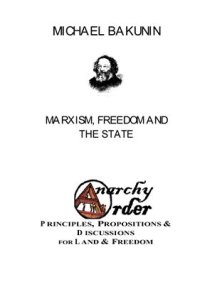
Ebook: Marxism, Freedom and the State
Author: Bakunin Michael.
- Genre: Other Social Sciences // Politics
- Tags: Политические дисциплины, Политология, Политическая идеология политические режимы и системы, Анархизм
- Language: English
- pdf
Web paper in engish (Интернет-издание на английском); Translated and Edited with a Biographical Sketch by K. J. Kenafick — 'Anarchive' "Anarchy is Order!": Principles, Propositions & Discussions for Land and Freedom. — 85 p.
First published in 1950 by Freedom Press.
Life of BakuninIntroductory
Marxist Ideology
The State and Marxism
Internationalism and the State
Social Revolution and the State
Political Action and the WorkersAppendix
Footnotes
First published in 1950 by Freedom Press.
I must Create a System or be enslav'd by another Man's. I will not Reason & Compare: my business is to Create– William Blake.During the 19th century, anarchism has develloped as a result of a social current which aims for freedom and happiness. A number of factors since World War I have made this movement, and its ideas, dissapear little by little under the dust of history.After the classical anarchism – of which the Spanish Revolution was one of the last representatives – a new kind of resistance was founded in the sixties which claimed to be based (at least partly) on this anarchism. However this resistance is often limited to a few (and even then partly misunderstood) slogans such as 'Anarchy is order', 'Property is theft'.Information about anarchism is often hard to come by, monopolised and intellectual; and therefore visibly disapearing. The anarchive or anarchist archive Anarchy is Order (in short A.O) is an attempt to make the 'principles, propositions and discussions' of this tradition available again for anyone it concerns. We believe that these texts are part of our own heritage. They don t belong to publishers, institutes or specialists.These texts thus have to be available for all anarchists an other people interested. That is one of the conditions to give anarchism a new impulse, to let the new anarchism outgrow the slogans. This is what makes this project relevant for us: we must find our roots to be able to renew ourselves. We have to learn from the mistakes of our socialist past. History has shown that a large number of the anarchist ideas remain standing, even during the most recent social-economic developments.Don't mourn, Organise!This book is Bakunin's version of the split between himself and Karl Marx that took place in the late 1860s and early 1870s. Bauknin saw the schism between them arising out of different perceptions of the function of the state in the Socialist program. Specifically, Bakunin held that the International tended to be too accepting of the concept of the state, which he viewed as a dangerous and dehumanizing institution. The state, he wrote "imposes injustice and cruelty on all its subjects, as a supreme duty. It restrains, mutilates, it kills the humanity in them, so that, ceasing to be men, they are no longer anything but citizens."Bakunin wrote the essays that detail his dispute with Marx from 1870-1872, prior to his expulsion from the International. Other essays regarding emancipation and the general characteristics of the state were excerpted from Federalism, Socialism and Anti-Theologianism, from 1867. K.J. Kenafick, an Australian editor and translator, combined these works into the book Marxism, Freedom and the State in 1950.
Liberty for all, and a natural respect for that liberty: such are the essential conditions of international solidarity.– BakuninContents:Foreword
Life of BakuninIntroductory
Marxist Ideology
The State and Marxism
Internationalism and the State
Social Revolution and the State
Political Action and the WorkersAppendix
Footnotes
Download the book Marxism, Freedom and the State for free or read online
Continue reading on any device:

Last viewed books
Related books
{related-news}
Comments (0)